Two-Way Radio Equipment Maintenance
Keep Your Radios Maintained to Get the Longest Life Span
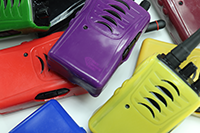 While radio equipment will pay for itself in any business, replacing these units can be costly. Your radios have become the backbone of your business, allowing your team to find each other and share information at lightning speeds. As such, you want to minimize any gaps in equipment availability around your facility due to waiting on repairs and replacements in order to keep your business running smoothly. With that in mind, we've compiled a comprehensive list of bullet points on maintaining your radio equipment in order to maximize it's life span.
• Wipe Down Radios Regularly
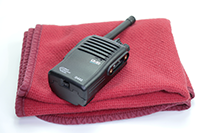 - It's a good idea to wipe down the units every two weeks or once a month. The units are being held in hands and it's an unpleasant fact that our bodies are always excreting oils. These build up on the units, especially in the cracks and corners and edges of the radio housing. While this generally will not hurt the functionality of the radios (unless there is build-up in the mic or speaker) this will ensure that they don't look or feel unappealing to the user, the unit is sanitary for the next user, not to mention that once build-up has been unattended for long periods of time it can become a real chore to clean up.
- It's a good idea to wipe down the units every two weeks or once a month. The units are being held in hands and it's an unpleasant fact that our bodies are always excreting oils. These build up on the units, especially in the cracks and corners and edges of the radio housing. While this generally will not hurt the functionality of the radios (unless there is build-up in the mic or speaker) this will ensure that they don't look or feel unappealing to the user, the unit is sanitary for the next user, not to mention that once build-up has been unattended for long periods of time it can become a real chore to clean up.Most of the time a warm, damp cloth can get the job done. However, on occasion it's a good idea to add some soap to the mix to break up the oils deposited by hands. Soak a cloth in hot, soapy water and ring it out before wiping. This ensures that you don't drip water in any crevices or water damage the inner components. The cloth should leave so little water behind that it can air dry in minutes without needing a towel. In the event that a unit has not been properly cleaned for a long period adding a stiff nylon brush to the mix will help you scrub out those corners and cracks. 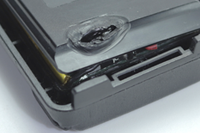 • If It's Hot Turn It Off
- Rechargeable Lithium-Ion batteries contain chemicals that can potentially start fires if they are defective, misused, or poorly maintained. Under normal operation, or in the charger, a radio and it's battery can get warm. If you ever notice that the radio is obviously warmer than normal (bordering on hot) take the battery off immediately and do not attempt to use it again. The battery could be defective or damaged. A damaged battery, at the worst, could explode, or could just melt to the radio and ruin the unit permanently. Either way, it's not worth the risk, it's safest to replace the battery immediately to avoid any kind of injury or additional costs.
• If It's Hot Turn It Off
- Rechargeable Lithium-Ion batteries contain chemicals that can potentially start fires if they are defective, misused, or poorly maintained. Under normal operation, or in the charger, a radio and it's battery can get warm. If you ever notice that the radio is obviously warmer than normal (bordering on hot) take the battery off immediately and do not attempt to use it again. The battery could be defective or damaged. A damaged battery, at the worst, could explode, or could just melt to the radio and ruin the unit permanently. Either way, it's not worth the risk, it's safest to replace the battery immediately to avoid any kind of injury or additional costs.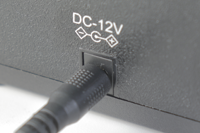 • Only Use The Included Charging Cable
- The power cord included with your radios/charger bases are manufactured to the specifications required to properly charge the radios. Using any cord other than the one included can carry a risk of melting your charging base, frying your radio batteries, or even starting a fire. We've seen melted chargers and radios as a result of using the wrong power supply, and always strongly recommend never using any cord other than what is supplied. If you ever have a cord that isn't working call us right away, we'd rather replace it for you than see your business deal with a fire due to improper usage!
• Only Use The Included Charging Cable
- The power cord included with your radios/charger bases are manufactured to the specifications required to properly charge the radios. Using any cord other than the one included can carry a risk of melting your charging base, frying your radio batteries, or even starting a fire. We've seen melted chargers and radios as a result of using the wrong power supply, and always strongly recommend never using any cord other than what is supplied. If you ever have a cord that isn't working call us right away, we'd rather replace it for you than see your business deal with a fire due to improper usage!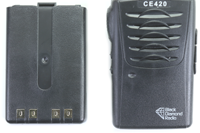 • Regularly Inspect the Battery
- At least once a month it's smart to remove the batteries from your radios to inspect them. Look at the two metal contacts that connect it to the radio, are they green or corroded in any way? Terminal corrosion is a big problem, if you see any it can be scrubbed off with a wire brush. However, if the corrosion returns there could be an issue with the battery and it may need to be replaced. Additionally, look for swelling or cracks in the plastic housing (cracks can indicate swelling that may not be as noticeable). Swelling is a sure sign that a battery is defective or damaged and also an indicator of danger. A swollen battery should immediately be put out of service and replaced.
• Regularly Inspect the Battery
- At least once a month it's smart to remove the batteries from your radios to inspect them. Look at the two metal contacts that connect it to the radio, are they green or corroded in any way? Terminal corrosion is a big problem, if you see any it can be scrubbed off with a wire brush. However, if the corrosion returns there could be an issue with the battery and it may need to be replaced. Additionally, look for swelling or cracks in the plastic housing (cracks can indicate swelling that may not be as noticeable). Swelling is a sure sign that a battery is defective or damaged and also an indicator of danger. A swollen battery should immediately be put out of service and replaced. • Don't Hold Them By The Antenna
- Carrying around a radio by the antenna creates two different issues. Firstly, your hand can make any received signals weak and cause you to miss a transmission (if the caller is far enough away). Secondly, it will wear the antenna out, as it is not designed to be a handle by which the unit is carried. Always hold the radio by it's body, carry it in a pocket with the antenna upright and unimpeded, or clip it to a belt or pocket with the belt clip. When using a belt clip the best position is on your side or behind you, clipping the radio to your waist in the front means that if you lean forward or bend down to pick something up your upper body will put pressure on the antenna, causing the antenna to wear out over time. Additionally, these bad habits can also cause a problem with the antenna mount, which is part of the radio. We don't repair those, a radio with this issue would require replacement.
• Don't Hold Them By The Antenna
- Carrying around a radio by the antenna creates two different issues. Firstly, your hand can make any received signals weak and cause you to miss a transmission (if the caller is far enough away). Secondly, it will wear the antenna out, as it is not designed to be a handle by which the unit is carried. Always hold the radio by it's body, carry it in a pocket with the antenna upright and unimpeded, or clip it to a belt or pocket with the belt clip. When using a belt clip the best position is on your side or behind you, clipping the radio to your waist in the front means that if you lean forward or bend down to pick something up your upper body will put pressure on the antenna, causing the antenna to wear out over time. Additionally, these bad habits can also cause a problem with the antenna mount, which is part of the radio. We don't repair those, a radio with this issue would require replacement.
• Never Leave In Direct Sunlight
 - As a general rule for all electronics, it is never a good idea to leave them sitting out in sunlight. Electronic devices, by nature, tend to get warm with heavy or even moderate use. Compounding that warmth with the sun on a hot day can push it beyond it's operating limits. This can lead to various issues, from fried transistors to exploding batteries, ultimately leading to having to replace the unit or it's battery. While it's okay to use the radio outside on a hot day, just avoid setting it down in direct sunlight for long periods or any situation where you know it could get hotter than it should be.
- As a general rule for all electronics, it is never a good idea to leave them sitting out in sunlight. Electronic devices, by nature, tend to get warm with heavy or even moderate use. Compounding that warmth with the sun on a hot day can push it beyond it's operating limits. This can lead to various issues, from fried transistors to exploding batteries, ultimately leading to having to replace the unit or it's battery. While it's okay to use the radio outside on a hot day, just avoid setting it down in direct sunlight for long periods or any situation where you know it could get hotter than it should be.
• Long Term Storage
 - If you are storing your system long term there are some guidelines that are wise to follow. First of all, only store in cool, dry places. Obviously, heat and water are not good for any kind of electronic device. Secondly, detach the batteries from the radio. If they are not going to be used there is no reason for them to be connected, and the connection will drain the battery faster. Li-Ion batteries do have a shelf life, especially because being on a shelf means they're not getting used. Roughly half a year after being stored a battery can reach a "beyond empty" state, at which point they become paperweights because they can no longer hold a charge... even a brand new battery. To avoid this there is maintenance to do about every 3 months. First, you will want to drain the battery entirely. Connect it to a radio, turn it on, and leave it. When you hear it say "low battery", or when you find the radio fully powered off, put it on the charger. It is not necessary to charge it fully, and is actually not recommended. 40-60% is the recommended charge, though it is impossible to determine exactly how much charge most two-way radio batteries contain. That being said, know how long it takes to charge one of your units fully, and take it off the charger in about half that time. Then remove the battery from the radio and put it back in storage.
- If you are storing your system long term there are some guidelines that are wise to follow. First of all, only store in cool, dry places. Obviously, heat and water are not good for any kind of electronic device. Secondly, detach the batteries from the radio. If they are not going to be used there is no reason for them to be connected, and the connection will drain the battery faster. Li-Ion batteries do have a shelf life, especially because being on a shelf means they're not getting used. Roughly half a year after being stored a battery can reach a "beyond empty" state, at which point they become paperweights because they can no longer hold a charge... even a brand new battery. To avoid this there is maintenance to do about every 3 months. First, you will want to drain the battery entirely. Connect it to a radio, turn it on, and leave it. When you hear it say "low battery", or when you find the radio fully powered off, put it on the charger. It is not necessary to charge it fully, and is actually not recommended. 40-60% is the recommended charge, though it is impossible to determine exactly how much charge most two-way radio batteries contain. That being said, know how long it takes to charge one of your units fully, and take it off the charger in about half that time. Then remove the battery from the radio and put it back in storage.
• Avoid Usage During Charge
Thank You!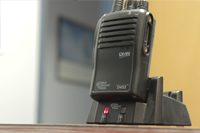 - A best practice is to allow the radio to charge without using it. While it won't be "the end of the world" if you do, drawing power from the battery while adding power to it doesn't do the battery any favors. There are two ways to avoid this. You can simply turn the radio off before you put it in the charger, which, for a truly good radio, works fine for most teams because the battery lasts beyond a full shift. The radios are turned off at the end of a shift and left on the charger overnight. In a situation where you need to continue to use the radio a good solution is to have an extra battery. Two-Way radio batteries often can be charged without the radio (all Black Diamond Radio units have this feature), so simply swap the battery on your radio with a fully charged battery and place the drained battery on the charger.
- A best practice is to allow the radio to charge without using it. While it won't be "the end of the world" if you do, drawing power from the battery while adding power to it doesn't do the battery any favors. There are two ways to avoid this. You can simply turn the radio off before you put it in the charger, which, for a truly good radio, works fine for most teams because the battery lasts beyond a full shift. The radios are turned off at the end of a shift and left on the charger overnight. In a situation where you need to continue to use the radio a good solution is to have an extra battery. Two-Way radio batteries often can be charged without the radio (all Black Diamond Radio units have this feature), so simply swap the battery on your radio with a fully charged battery and place the drained battery on the charger.Black Diamond Radio thanks you for visiting our site and we hope that this guide has been informative and helps you keep your radios in stellar condition for years to come. We've seen well maintained radios last for up to 10 years, though the vast majority don't make it that long, especially in heavy usage situations. That's why we have a 2-year "If You Can Break It We Will Replace It" warranty that is included with every radio we sell. We know that a unit should last you at least 2 years to make your investment really count, so we cater to that philosophy. If you have any further questions about taking care of your two-way radio system fell free to give us a call any time. We don't have menus, we just answer the phone and then your questions, and we are happy to share our advice in regards to two-way communication systems! Have a fantastic day! |
- Two-Way Radios
- Radio Accessories
- Repeaters
- Aviation
- Earpieces
- Connector Chart
- Earpieces By Radio/Connector
- Black Diamond Radio
- Motorola
- M1 - CLS 1110, CLS 1410, CP200, CP200D,
DLR1020, RDM2070D - M2 - Motorola Visar 3.5mm Threaded
- M3 - HT1000, MTS2000, XTS, 1500
XTS2500, XTS3000 - M4 - HT1250, HT750, MTP700, MTP850
MTX950, MTX960, MTX9250 - M5 - EX500, EX600, GL2000, P328plus
GP338plus, PTX760plus,
GP344, GP388, PRO5150Elite - M6/FRS - Talkabout, Spirit GT, Spirit GT Plus
- M7 - APX4000, APX6000, APX7000, APX8000
XPR3500E, XPR6550, XPR7550, XPR7550E - M10 - CLP1010, CLP1040, CLP1060
- M11 - CLP1010E, CLP1080E, SL300, SL3500e, SL7550, SL7590
- M12 - XPR3300, XPR3500
- M1 - CLS 1110, CLS 1410, CP200, CP200D,
- Kenwood
- Harris - M/A-Com
- Midland
- RELM
- Vocera/Ascom/Theatro
- Vertex - Yaesu
- HYT / Hytera
- TYT
- Retevis
- AnyTone
- Earpieces by Style
- Bluetooth
- Industries
- Adapters
- Earmolds
- Earpiece Parts
- Misc Accessories



